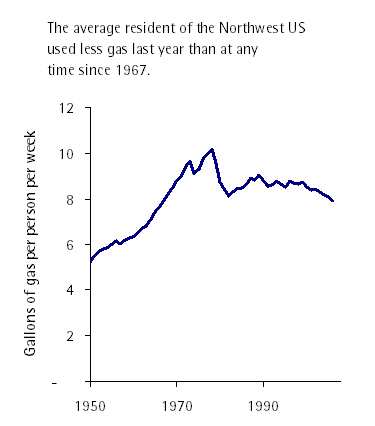Astonishing. Based on the best estimates I can come up with, residents of the US Northwest are on track to use a little less gasoline in 2006 than in 1999. That’s right, the region’s gasoline consumption—total, not per capita—has flatlined over the last 7 years.
Over the same period, the region’s population grew by 9 percent or so. And that means that per capita gas consumption fell by about 9 percent between 1999-2006. As far as I can tell, that puts per person gas consumption in 2006 lower than at any point in the last 4 decades!
There are a probably a couple of forces in play here. First, the region went through a recession a few years back—unemployment was up and wages were flat. So some of the decline in personal consumption may have stemmed from a slow economy.
Second, gas was at historic inflation-adjusted lows in the late 1990s, but since then prices have more than doubled; and much of the price increase occurred just as the recession was easing. People have responded to high prices by cutting back on consumption—using transit a bit more, buying slightly more efficient cars, perhaps driving a bit less, or using the more efficient car if two are parked in the driveway.
Third, a gradual trend towards more compact and centered urban development may be reducing how much city-dwellers need to drive to get to where they need to go.
No matter what the cause, it’s reason for celebration in a gloomy, rain-soaked season.









Alan Durning
That’s exciting news, Clark.One other factor that may be worth mentioning. Diesel fuel consumption is up, if I’m not mistaken. In fact, it’s been growing faster than population.What does the growth of diesel do to total motor vehicle fuel consumption (the combination of diesel and gasoline)?I suspect that diesel’s growth largely reflects the increasing importance of long-distance transport and trade in the Northwest’s economy, that is, more trucks driving around.But I also wonder whether there’s been some substitution. Specifically, has there been a substitution of diesel-powered vehicles for gasoline-powered ones? More diesel passenger cars (not that I’m aware of)? More diesel trucks (rather than gasoline ones)? Here, I’m uninformed.
Clark Williams-Derry
Good question, Alan—I’ve wondered about that myself. I have a hard time believing that an increase in diesel cars has been responsible for more than a percentage point or two of the fall in per-capita gas. But I could be wrong. A project for another day, perhaps…
PatF
Alan, Clark,You may be onto something. (1) Two people i know have bought a Suburban and a VW into which they pour biodiesel. (2) One of my sons has started riding the bus from Tacoma into work in Seattle, when he can. When the bus stops running before he can leave work (midnight to 4am), he takes my car. So we’re sharing one vehicle. If he needs, i take the bus to my evening activities. Most of the time, it sits in front of my house.
colin
Clark, thanks for digging up these figures. Would it be possible to track the figures for individual cities? Then we could compare the major cities and have bechmarks to compete against, like Kyoto.It looks like we use about 8 galls/person/week. Or about 30 miles/day auto travel. I suspect the people who commute from one suburb to another, e.g. Tacoma to Everett are the biggest culprits.